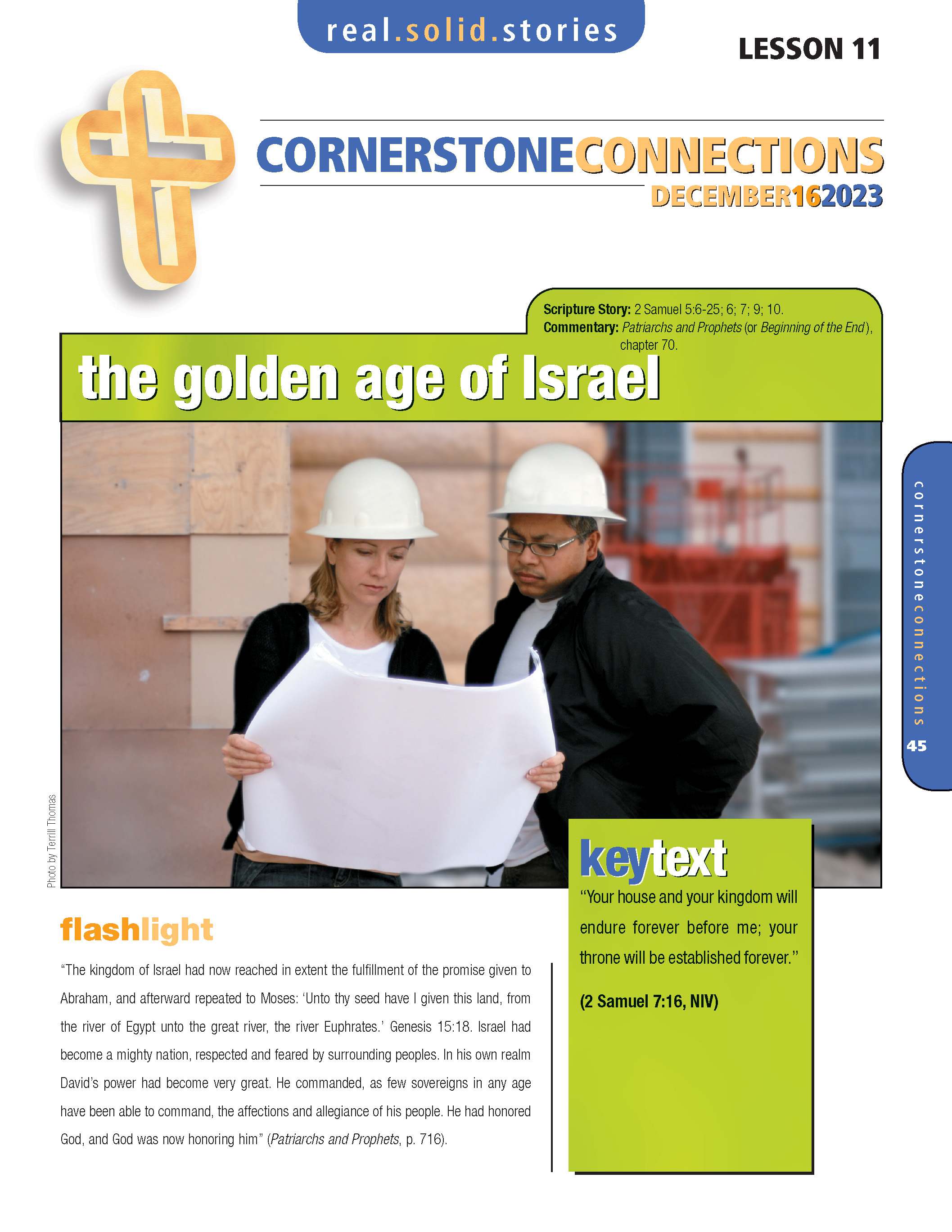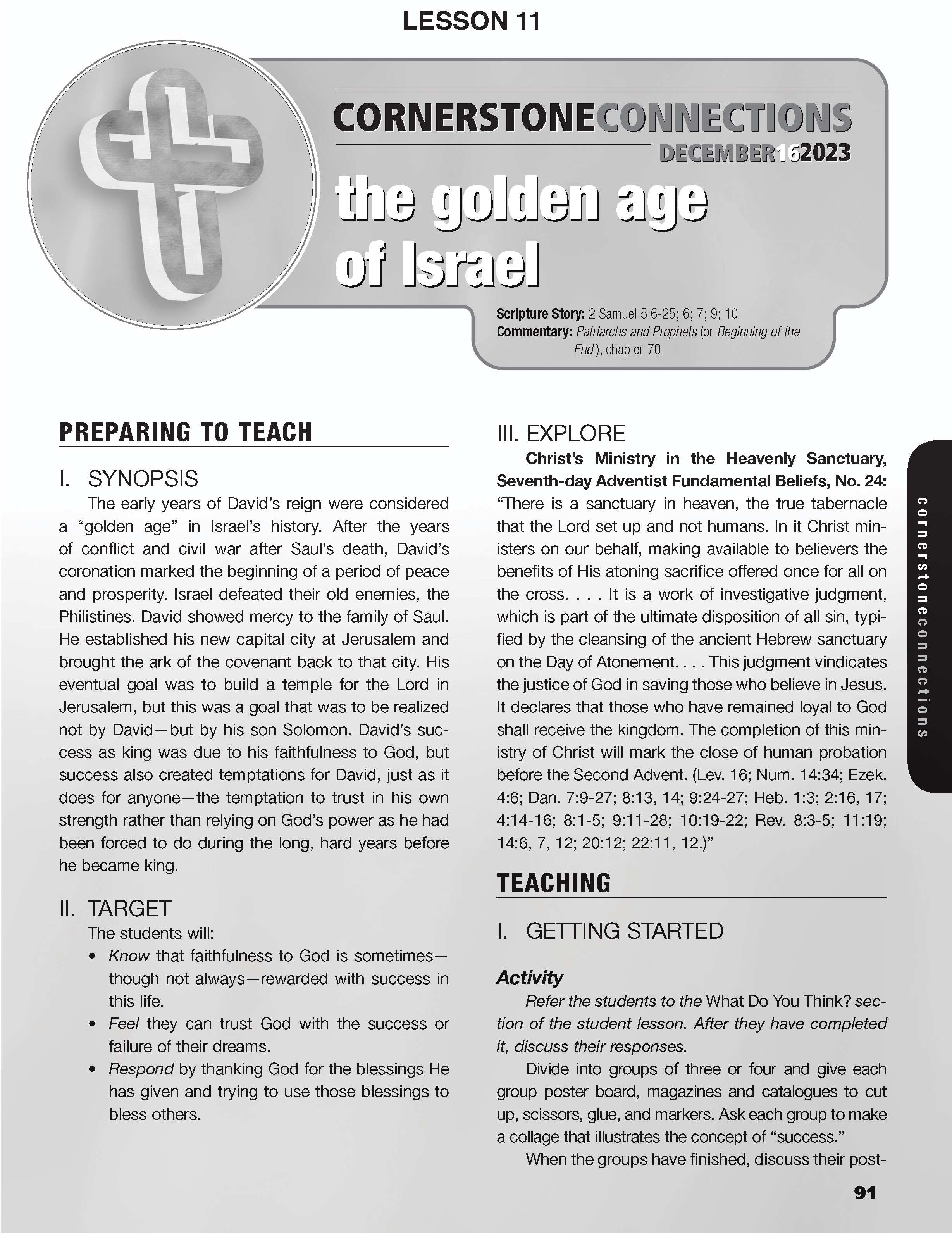“The Golden Age of Israel”
Click below to download the Cornerstone Connections leader’s guide and student lesson. This week’s resources also include two lesson plans and a discussion starter video which offer different ways of looking at the topic. Each lesson plan includes opening activities, scripture passages, discussion questions, and real-life applications.
2 Samuel 5:6-25; 6; 7; 9; 10.
After the long struggle to the throne, David finally unites Israel in prosperity.
Patriarchs and Prophets (Beginning of the End), Chapter 70
The Prosperous Reign of David

SCRIPTURE PASSAGES
OVERVIEW
David and Saul were different. Both men had larger than life personalities, but one had a hankering for following his own path while the other chose to listen to the leading of God, at least most of the time. David exuded confidence and a humble spirit. He chose to listen to God and his people. Today’s lesson is about how David and Israel entered a time of prosperity. We will explore what that looked like and how it was possible.

OPENING ACTIVITY: CREATE A WANTED POSTER
Supplies: paper and pens/pencils/markers
DISCUSSION
TRANSITION
Changes in leadership can be difficult, especially if the two leaders were significantly difficult. You may have noticed that recently in your own country. David had to walk carefully as he assumed command because a misstep could have caused him to lose his kingdom.
BIBLE STUDY GUIDE
Read 2 Samuel 5:6-9.
6 The king and his men marched to Jerusalem to attack the Jebusites, who lived there. The Jebusites said to David, “You will not get in here; even the blind and the lame can ward you off.” They thought, “David cannot get in here.” 7 Nevertheless, David captured the fortress of Zion—which is the City of David.
8 On that day David had said, “Anyone who conquers the Jebusites will have to use the water shaft to reach those ‘lame and blind’ who are David’s enemies.” That is why they say, “The ‘blind and lame’ will not enter the palace.”
9 David then took up residence in the fortress and called it the City of David. He built up the area around it, from the terraces inward.
DISCUSSION
Read 2 Samuel 6:1-19.
David again brought together all the able young men of Israel—thirty thousand. 2 He and all his men went to Baalah in Judah to bring up from there the ark of God, which is called by the Name, the name of the Lord Almighty, who is enthroned between the cherubim on the ark.
3 They set the ark of God on a new cart and brought it from the house of Abinadab, which was on the hill. Uzzah and Ahio, sons of Abinadab, were guiding the new cart 4 with the ark of God on it, and Ahio was walking in front of it. 5 David and all Israel were celebrating with all their might before the Lord, with castanets, harps, lyres, timbrels, sistrums and cymbals.
6 When they came to the threshing floor of Nakon, Uzzah reached out and took hold of the ark of God, because the oxen stumbled. 7 The Lord’s anger burned against Uzzah because of his irreverent act; therefore God struck him down, and he died there beside the ark of God.
8 Then David was angry because the Lord’s wrath had broken out against Uzzah, and to this day that place is called Perez Uzzah.
9 David was afraid of the Lord that day and said, “How can the ark of the Lord ever come to me?” 10 He was not willing to take the ark of the Lord to be with him in the City of David. Instead, he took it to the house of Obed-Edom the Gittite. 11 The ark of the Lord remained in the house of Obed-Edom the Gittite for three months, and the Lord blessed him and his entire household.
12 Now King David was told, “The Lord has blessed the household of Obed-Edom and everything he has, because of the ark of God.” So David went to bring up the ark of God from the house of Obed-Edom to the City of David with rejoicing. 13 When those who were carrying the ark of the Lord had taken six steps, he sacrificed a bull and a fattened calf. 14 Wearing a linen ephod, David was dancing before the Lord with all his might, 15 while he and all Israel were bringing up the ark of the Lord with shouts and the sound of trumpets.
16 As the ark of the Lord was entering the City of David, Michal daughter of Saul watched from a window. And when she saw King David leaping and dancing before the Lord, she despised him in her heart.
17 They brought the ark of the Lord and set it in its place inside the tent that David had pitched for it, and David sacrificed burnt offerings and fellowship offerings before the Lord. 18 After he had finished sacrificing the burnt offerings and fellowship offerings, he blessed the people in the name of the Lord Almighty. 19 Then he gave a loaf of bread, a cake of dates and a cake of raisins to each person in the whole crowd of Israelites, both men and women. And all the people went to their homes.
DISCUSSION
Read 2 Samuel 9.
1David asked, “Is there anyone still left of the house of Saul to whom I can show kindness for Jonathan’s sake?”
2 Now there was a servant of Saul’s household named Ziba. They summoned him to appear before David, and the king said to him, “Are you Ziba?”
“At your service,” he replied.
3 The king asked, “Is there no one still alive from the house of Saul to whom I can show God’s kindness?”
Ziba answered the king, “There is still a son of Jonathan; he is lame in both feet.”
4 “Where is he?” the king asked.
Ziba answered, “He is at the house of Makir son of Ammiel in Lo Debar.”
5 So King David had him brought from Lo Debar, from the house of Makir son of Ammiel.
6 When Mephibosheth son of Jonathan, the son of Saul, came to David, he bowed down to pay him honor.
David said, “Mephibosheth!”
“At your service,” he replied.
7 “Don’t be afraid,” David said to him, “for I will surely show you kindness for the sake of your father Jonathan. I will restore to you all the land that belonged to your grandfather Saul, and you will always eat at my table.”
8 Mephibosheth bowed down and said, “What is your servant, that you should notice a dead dog like me?”
9 Then the king summoned Ziba, Saul’s steward, and said to him, “I have given your master’s grandson everything that belonged to Saul and his family. 10 You and your sons and your servants are to farm the land for him and bring in the crops, so that your master’s grandson may be provided for. And Mephibosheth, grandson of your master, will always eat at my table.” (Now Ziba had fifteen sons and twenty servants.)
11 Then Ziba said to the king, “Your servant will do whatever my lord the king commands his servant to do.” So Mephibosheth ate at David’s table like one of the king’s sons.
12 Mephibosheth had a young son named Mika, and all the members of Ziba’s household were servants of Mephibosheth. 13 And Mephibosheth lived in Jerusalem, because he always ate at the king’s table; he was lame in both feet.
DISCUSSION

APPLICATION
David is a complicated character. David was a murderer, an abuser of power and influence, a warrior, kind and generous, and a person who listened to God. Using all those attributes to describe one person is difficult. How can a murderer and an abuser of power be a kind, generous follower of God? Does this mean that God is a bad judge of character?
No! It means that God uses flawed people. It means that God can transform a person. It means that nobody is perfect, and God can use them which means that there is hope for people like us. When considering the story of David it is important to look at the entire picture. If one takes small snapshots and puts value statements of him based on the snapshots, David will either look brilliant or evil. However, if one looks at the entire picture, one sees a flawed person who loves God and is willing to let God work in his life.
FOLLOW UP
Journal about the following:

SCRIPTURE PASSAGES
LEADER’S NOTE
For a Relational Bible Study (RBS) you’ll want to get into the Scripture passage and encourage the youth to imagine participating in the story while it’s happening. Then you will be able to better apply it to your own situation today.
You will need to ask God for the Holy Spirit to be present as your small group discusses the questions (no more than 3-6 people in a group is recommended). Start with the opening question. It is a personal question and the answer is unique for each individual. There is no right answer and nobody is an expert here, so don’t be surprised when you hear different responses. You are depending on the Holy Spirit to be present and to speak through your group. Say what God prompts you to say, and listen to what others share.
Take turns reading the chapter out loud. Follow that with giving the students some time to individually mark their responses to the questions (a PDF version of the handout is available as a download). This gives each person a starting point for responding when you start to share as a group. Next, begin the discussion by asking the students to share what they marked and why on each question as you work your way through. Feel free to take more time on some questions than others as discussion warrants.
Encourage each person in the group to apply what is discussed to their personal lives and to share with the group what they believe God wants them to do. Then ask them to pray that God will help each of them to follow through in doing so. Remind them to expect that God will show them ways to live out the message of this passage in the coming week, and that they are free to ask others in the group to help hold them accountable.
OVERVIEW
God’s people seem to have lots of ups and downs, but maybe more downs! Our passage for this week describes what some have considered “The Children of Israel’s Golden Years.” David had finally secured the kingdom and all Israel’s enemies had been subdued. The people loyally followed God. In fact, in future years, God’s people would look back and pray for a return to these times. David was the Israelites' quintessential king—no one compared to him before or after.
David felt a desire to build a new temple for God, especially after he had just completed a magnificent palace for himself. But God told him not to do so. Instead of being upset, David graciously accepted God’s directive, and ended up praising God in a prayer of gratitude and praise rather than “please, please, please.”
Let’s take a week to celebrate God’s goodness with his obedient people, and let’s see what we can copy today.
Couldn’t Be Better
Which is a nicer building—your house or your church?
Read 2 Samuel 7:1-29.
1After the king was settled in his palace and the Lord had given him rest from all his enemies around him, 2 he said to Nathan the prophet, “Here I am, living in a house of cedar, while the ark of God remains in a tent.”
3 Nathan replied to the king, “Whatever you have in mind, go ahead and do it, for the Lord is with you.”
4 But that night the word of the Lord came to Nathan, saying:
5 “Go and tell my servant David, ‘This is what the Lord says: Are you the one to build me a house to dwell in? 6 I have not dwelt in a house from the day I brought the Israelites up out of Egypt to this day. I have been moving from place to place with a tent as my dwelling. 7 Wherever I have moved with all the Israelites, did I ever say to any of their rulers whom I commanded to shepherd my people Israel, “Why have you not built me a house of cedar?” ’
8 “Now then, tell my servant David, ‘This is what the Lord Almighty says: I took you from the pasture, from tending the flock, and appointed you ruler over my people Israel. 9 I have been with you wherever you have gone, and I have cut off all your enemies from before you. Now I will make your name great, like the names of the greatest men on earth. 10 And I will provide a place for my people Israel and will plant them so that they can have a home of their own and no longer be disturbed. Wicked people will not oppress them anymore, as they did at the beginning 11 and have done ever since the time I appointed leaders over my people Israel. I will also give you rest from all your enemies.
“ ‘The Lord declares to you that the Lord himself will establish a house for you: 12 When your days are over and you rest with your ancestors, I will raise up your offspring to succeed you, your own flesh and blood, and I will establish his kingdom. 13 He is the one who will build a house for my Name, and I will establish the throne of his kingdom forever. 14 I will be his father, and he will be my son. When he does wrong, I will punish him with a rod wielded by men, with floggings inflicted by human hands. 15 But my love will never be taken away from him, as I took it away from Saul, whom I removed from before you. 16 Your house and your kingdom will endure forever before me; your throne will be established forever.’ ”
17 Nathan reported to David all the words of this entire revelation.
18 Then King David went in and sat before the Lord, and he said:
“Who am I, Sovereign Lord, and what is my family, that you have brought me this far? 19 And as if this were not enough in your sight, Sovereign Lord, you have also spoken about the future of the house of your servant—and this decree, Sovereign Lord, is for a mere human!
20 “What more can David say to you? For you know your servant, Sovereign Lord. 21 For the sake of your word and according to your will, you have done this great thing and made it known to your servant.
22 “How great you are, Sovereign Lord! There is no one like you, and there is no God but you, as we have heard with our own ears. 23 And who is like your people Israel—the one nation on earth that God went out to redeem as a people for himself, and to make a name for himself, and to perform great and awesome wonders by driving out nations and their gods from before your people, whom you redeemed from Egypt? 24 You have established your people Israel as your very own forever, and you, Lord, have become their God.
25 “And now, Lord God, keep forever the promise you have made concerning your servant and his house. Do as you promised, 26 so that your name will be great forever. Then people will say, ‘The Lord Almighty is God over Israel!’ And the house of your servant David will be established in your sight.
27 “Lord Almighty, God of Israel, you have revealed this to your servant, saying, ‘I will build a house for you.’ So your servant has found courage to pray this prayer to you. 28 Sovereign Lord, you are God! Your covenant is trustworthy, and you have promised these good things to your servant. 29 Now be pleased to bless the house of your servant, that it may continue forever in your sight; for you, Sovereign Lord, have spoken, and with your blessing the house of your servant will be blessed forever.”
1. Why did David stop fighting his enemies?
2. Why did David want to build a temple for God?
3. Why didn’t God want David to build a temple?
4. What did God point out He had already done for David?
5. What did God promise for David’s future?
6. When are you likely to praise God?
7. What has God done for you? What do you want to do for God?
8. David’s prayer included lots of praises to God. What are your current praises to God?
SUMMARY
Praise God!!! It’s something we can do more. That’s what David did. We can do the same when we focus on what God has done and what he promises to do for us in the future.

APPLICATION
Make this a week of praise to God. It’s the Christmas season with an emphasis on the birth of Jesus about 2,000 years ago. Praise God this week with some of the options listed below.
David listed a number of praises to God in today’s chapter (2 Samuel 7).
Here are seven Psalms of praise for you for this week. (Some psalms are laments, but the ones selected here are praise Psalms.)
Here are those seven praise Psalms: Psalm 8, Psalm 40, Psalm 65, Psalm 98, Psalm 145, Psalm 146, Psalm 150. Do them in any order you choose.
The Psalms in the Bible have the lyrics but not the music. Choose seven praise songs (one for each day of the week) for your own playlist. Here are a few links to get you started:
https://www.youtube.com/watch?v=f2oxGYpuLkw,
https://www.youtube.com/watch?v=2go_dOJVwc4,
https://www.youtube.com/watch?v=TuVX13GvKEE,
https://www.youtube.com/watch?v=SlEEgMWwxhc,
https://www.youtube.com/watch?v=wK8w7N9a7Wo,
https://www.youtube.com/watch?v=tbWto1z40v4.




